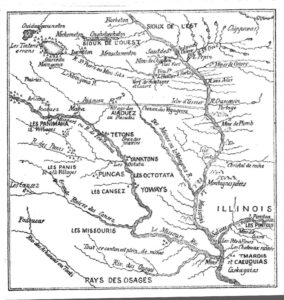Fracking violates treaties: Tribes protest
 PINE RIDGE – On Aug. 31, Oglala Sioux Tribal Acting President Thomas Poor Bear sent an official letter to the federal Bureau of Land Management requesting it take into account overlooked treaty rights before issuing a decision on a proposal to open up Wyoming oil-and-gas fracking.
PINE RIDGE – On Aug. 31, Oglala Sioux Tribal Acting President Thomas Poor Bear sent an official letter to the federal Bureau of Land Management requesting it take into account overlooked treaty rights before issuing a decision on a proposal to open up Wyoming oil-and-gas fracking.
The origin history of the Sioux tribes in relation to the Black Hills, which was used as a basis for decision making in the development, “is based on the speculation of white historians,” the “Letter of Protest to the Final Environmental Impact Statement (FEIS) and Proposed Resource Management Plan Amendment (RMPA) for the Converse County Oil and Gas Project” complains.
The letter is filed on behalf of all Sioux tribes in the Great Plains Tribal Water Alliance, Inc., which coordinate Missouri River Basin water protection.
The impact statement “did not include any history from Sioux spiritual leaders and historians,” leading to a charge that BLM Authorizing Officer Stephanie Connally “failed to fulfill the intent and process outlined in the National Environmental Policy Act and implementing regulations,” as necessary for cultural resource preservation.
The protest letter notes that the area under consideration has not been ceded to the United States by the Great Sioux Nation and remains under the jurisdiction of the Oceti Sakowin due to the Ft. Laramie treaties of 1851 and 1868.
“Thus, the Sioux Nation enjoys extensive treaty rights in the project area, including reserved water rights to the Missouri River and Cheyenne River downstream from the project area,” the tribes argue.
“Significantly, Indian water rights include the right to adequate water quality for all beneficial uses,” they note, citing the Winters Doctrine, a legal conclusion that states, “Upstream, non-Indian users may be required to limit their diversions as necessary to achieve or preserve the required quality of tribal water rights.”
In addition, groundwater is jeopardized by fracking and the injection of wastewater, and the groundwater “interrelates” with surface water in the Cheyenne River headwaters, they note
The Converse County Oil and Gas Project would significantly accelerate oil and gas development, magnifying the impacts on water and other resources of the existing energy extraction in the affected water basin. A total of 5,000 new wells would be authorized.
Based on oil companies’ estimates, the project’s water requirements would range from 30,500 acre-feet to 61,500 acre-feet per year. The tribes claim, “That is too wide of a range to accurately determine the impacts of the water diversions on the water resources in the affected area.
“The BLM totally ignores the existence of Indian water claims in the Cheyenne River watershed, and fails to disclose the potential impacts of contamination to Indian waters,” their letter says. “The estimate of water use lacks credibility.”
In addition to the water quantity issue, the tribes raise a water quality issue: “The BLM underestimates the percent chance of migration from a fracked well and ignores the significant environmental risk posed by the injection of waste fluid.”
They add, “Studies documenting groundwater contamination in close proximity to frack wells abound, but BLM ignores them.”
Also, they maintain, “Methane gas contamination is a significant concern, but is not properly evaluated by BLM.” They cite a study by the National Academy of Sciences determining that average methane concentrations in domestic wells near fracking sites are 17 times higher than wells in inactive areas.
The effects of the project could be bad for wildlife and legally protected traditional Native hunting or fishing rights, they mention.
“BLM has a duty to include these items…. Accordingly, the Oglala Sioux Tribe respectfully requests the BLM, as the tribe’s trustee, to hold off on issuance of a Record of Decision until after concerns in this protest are resolved to the satisfaction of the OST and the 1851 treaty signatory tribes, “ the letter concludes.
(Contact Talli Nauman at talli.nauman@gmail.com)
The post Fracking violates treaties: Tribes protest first appeared on Native Sun News Today.
